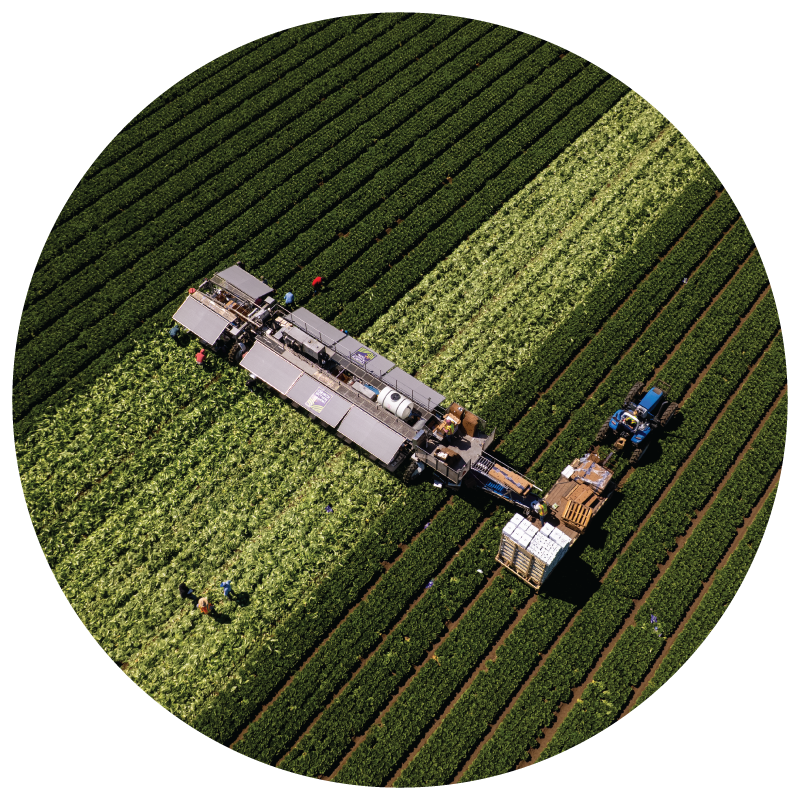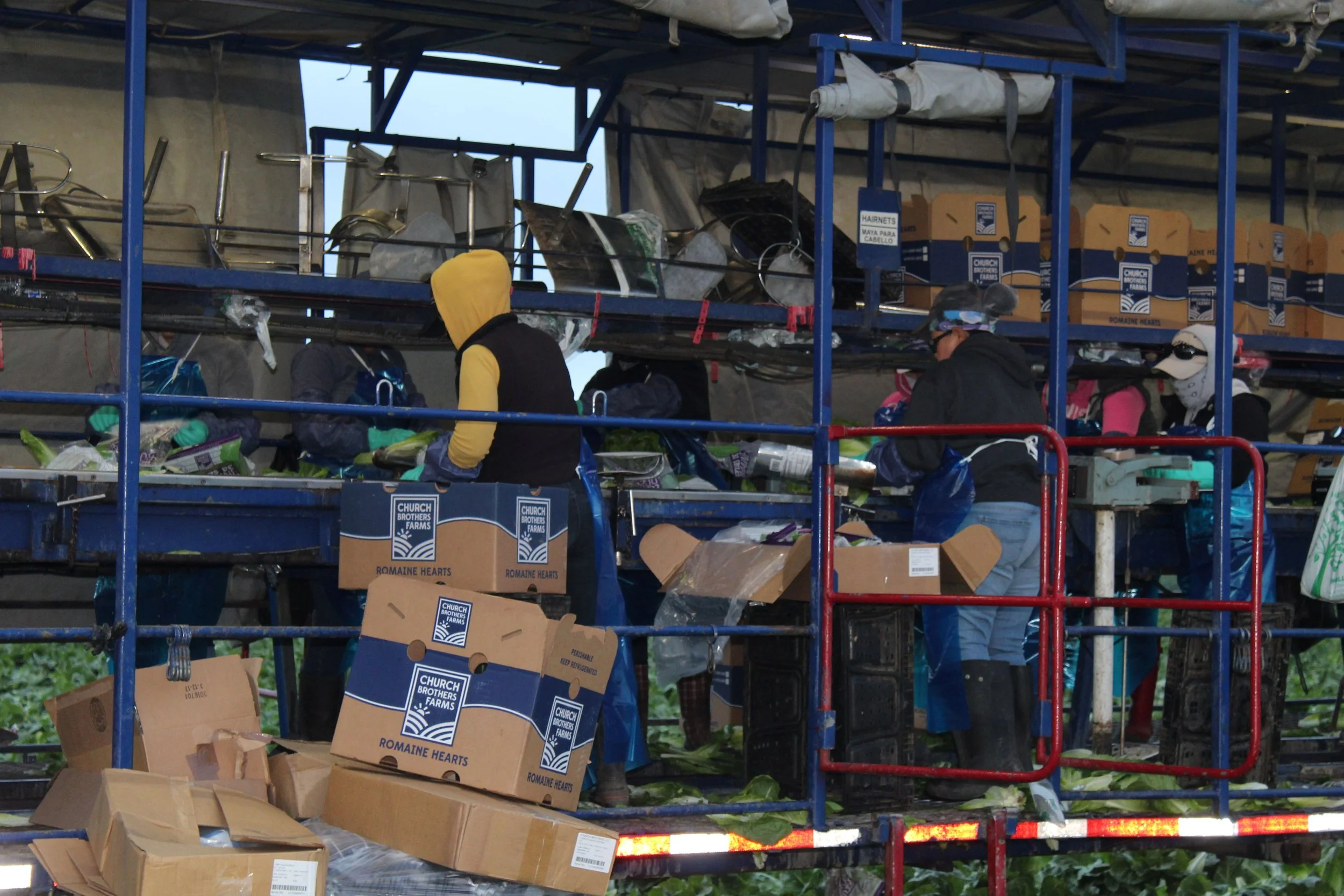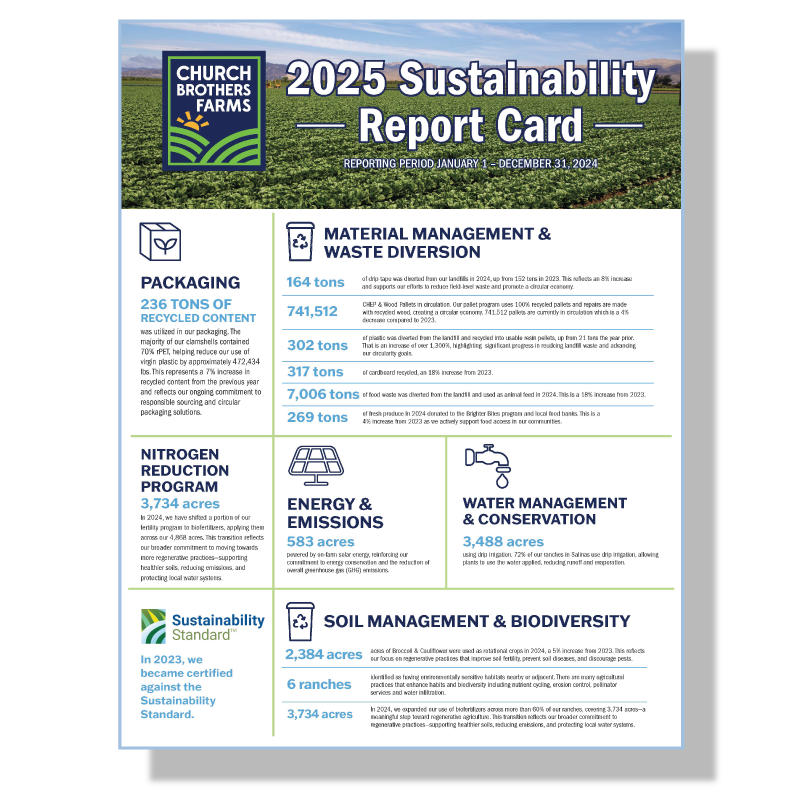Sustainability
Growing for Today.
Protecting Tomorrow
People | Planet | Purpose
At Church Brothers Farms, sustainability is a way of life. We use Key Performance Indicators (KPIs) to guide our efforts, helping us measure progress and align our operations with the health of the land. From reducing packaging and conserving water and energy, to protecting soil health and preserving farmland, every action counts.
Using regenerative farming practices, we’ve reduced chemical use, improved working conditions for our team, and minimized our environmental footprint—all while maintaining the industry-leading quality you expect. We strive to balance our needs with those of the Earth, nurturing the land so it can continue to flourish for generations to come. Explore our KPIs below to see the tangible ways we’re making a difference in each focus area.
-
Maintaining soil health and biodiversity within our growing operations includes focusing on healthy, nutrient-rich soil while promoting biodiversity in the ecosystems around us.
Our approach includes crop rotation, compost application where possible, regular soil testing, precision fertilization, and cover cropping, all designed to restore ecosystems and reduce our footprint. These practices not only enrich the land but also support pollinators, improve water retention, and reduce erosion. By combining science, stewardship, and accountability, we’re building a farming model that gives back to the earth—and sets the stage for a more sustainable future.
-
Water management is crucial not just to our business, but to ensuring the overall availability of clean water throughout California and Arizona.
We use drip irrigation to maximize our efficiency. This low-volume system delivers water close to the plant root zone, minimizing evaporation. In addition, all irrigation water is recycled.
Each of our growers works with the State Water Resources Control Board to protect ground water from pesticide contamination. Increased dependency on groundwater for drinking and other beneficial uses makes these practices necessary to ensure quality groundwater for future supply needs.
-
We track our energy use both on the farm and at our processing plant. Church Brothers looks to find renewable energy sources to power our offices and plants. The launch of our Cogen clean power station in 2017 was the beginning of a new chapter on energy and emissions savings. Since then, we have continued to take steps forward, including switching more than 800 growing acres to solar-powered water pumps.
-
Less food waste means less carbon emissions, so we work to divert as much from landfills as possible. We donate large amounts of surplus product to non-profit organizations who give it to families in need. We also send green waste to local ranchers to be used as livestock feed.
We’re working hard to strengthen our waste management program. From cardboard and plastic to wood, we actively recycle and divert materials from landfills, reducing our environmental footprint across operations. But we’re not stopping there. We're continuously exploring smarter systems, better partnerships, and innovative solutions to minimize waste, reuse resources, and build a cleaner, more responsible future for agriculture.
-
At Church Brothers, we are constantly looking for ways to make our packaging more sustainable and beneficial to the environment.
We do this in the following ways:
Shipping cartons made from recycled materials
All pallets are reused/recycled as part of the CHEP pallet program
Field totes and bins are repaired and reused
All on-farm plastics, drip tape, aluminum, and steel are upcycled
Maintaining soil health and biodiversity within our growing operations includes focusing on healthy, nutrient-rich soil while promoting biodiversity in the ecosystems around us.
Our approach includes crop rotation, compost application where possible, regular soil testing, precision fertilization, and cover cropping, all designed to restore ecosystems and reduce our footprint. These practices not only enrich the land but also support pollinators, improve water retention, and reduce erosion. By combining science, stewardship, and accountability, we’re building a farming model that gives back to the earth—and sets the stage for a more sustainable future.



